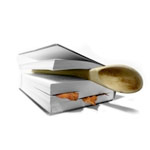 Рецепт Bruno's Panettone
Рецепт Bruno's Panettone
Ингредиенты
|
|
Инструкции
- Madeleine's Notes:Note which three glass bowls will be needed. I have chosen this recipe because it involves all the steps of rich bread baking from the chef through to the baked product without taking days to prepare. For the preparation of this bread, I am using the techniques explained in great detail on pages 241-243 of "Le Ricette Regionali Italiane", by Maria Gosetti della Salda, Milan, Italy, 1967. The amount and choice of ingredients were recommended by my Milan-born cousin Bruno Asnaghi. I have adapted the proportions to American unbleached all-purpose flour. The cake flour in the recipe is used exclusively to coat the raisins and citron and prevent them from falling to the bottom of the bread.
- Best freezing stage: Fully baked
- Yield: 3 rich cakelike breads each to be baked in one 1-qt tall pyrex glass bowl, for a total of 24 servings.
- Make the chef: Mix the flour, yeast, and water together in a medium-size bowl till homogeneous. Cover with a piece of cheesecloth and let ferment and rise 3 full hrs at room temperature in the warmest corner of the kitchen.
- Make the levain: In a large bowl mix together the flour and sugar. Make a well in the center of the flour and to it add in the chef; gradually blend the chef into the flour, adding also water as needed till the levain is homogeneous. Cover with the same cheesecloth and let ferment and rise overnight in a cooler corner of the kitchen.
- Make the intermediate dough: Put the egg yolks and the whole egg in a large bowl. Beat them into a thick omelette batter, then stir in the sugar and whisk till the mix turns semithick and foamy (no need to reach the ribbon stage, though). Make a well in the flour and salt mixed together, gradually add in the beaten Large eggs, them the levain, using a wooden spatula and lifting the dough to aerate it at the same time. Continue beating gently as you introduce the melted, barely lukewarm butter into the dough. When the dough is homogeneous, cover it with the cheesecloth and let it rise at room temperature in the warmest corner of the kitchen till doubled in bulk. Gently punch the dough down and let it rise again to the highest volume it will go, 1 to 1 1/2 hrs.
- Make the final dough: While the intermediate dough rises, soak the raisins and citron in the mixed orange flower water and Marsala. Cover and let soak till the intermediate dough has risen for the second time. Drain the fruit from the flavorings keeping any liquid left at the bottom of the bowl; pat the fruit dry, toss it into the cake flour to coat well, and set aside. Cream the 3/4 c. butter with the tips of your fingers and divide it into four equal parts. Set aside at room temperature. Make a well in the remaining flour, fold in the salt, fruit, and the grnd flavorings; add in the already risen dough to the center of the well together with any remaining liquid flavorings. Gradually bring the dry flour into the intermediate dough. As soon as all the flour has been incorporated, put one part of the butter at the four poles of the dough; using your fingertips, cream each quarter of the butter into one quarter of the dough.
- Beat with a few strokes of the hand, then return to a large clean bowl and let rise another 1 1/2 hrs. Punch the dough gently down and aerate it with a few slaps of the hand, but don't knead it. Butter each glass bowl with 1 Tbsp. each of the remaining butter and line its bottom with a circle of parchment paper. Add in one third of the dough to each bowl. Let proof till the dough reaches about 1/3 inch above the rim of each bowl, 40 to 45 min. Preheat the oven to 400F while the cakes are proofing.
- Using a razor blade dipped in flour, cut a semicircular line 1/6 inch deep into the top of each cake. Put the cakes to bake 20 min on the middle rack of the oven. Turn the oven down to 325F and continue baking another 20 min. Turn the oven off and let the cakes finish cooking in the dying oven another 5 - 10 min. The cakes are done when a metal skewer inserted at the center of each comes out dry and burning to the top of the hand. Remove from the oven, unmold on a cake rack, and cold completely. Wrap the cakes in aluminum foil and store 2 days in a breadbox before serving. Serve lightly dusted with confectioners' sugar.
